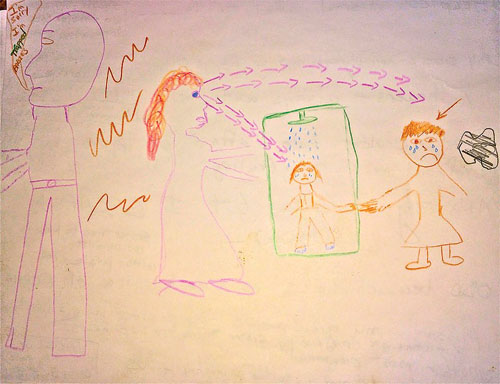.jpg)
Riverdale, NY—I am Second Generation (2G), a daughter of Holocaust survivors living in Englewood, and I am a firm believer in the notion that the expressive arts allow our subconscious thoughts and emotions become more perceptible, permitting thoughts and feelings to come to the surface. Expressive art helps us become aware of our deep-rooted anxieties and depression; it helps to discuss it, learn coping skills and eventually heal. I find that expressive arts helps people who suffer from Post Traumatic Stress Disorder, anxieties, depression, social skills, behavior disorders, eating disorders, loss of loved one, learning disabilities, and all other sorts of mental and physical disorders.
Though I normally work with individuals, I believe group workshops allow the participants to express themselves in a non-judgmental forum. As a daughter of Holocaust survivors, I feel that belonging to a group improves morale and makes participants feel that they are not alone.
Recently I joined a Facebook page called Daughters of Holocaust Survivors, a closed group started by 2G Evelyn Lerner, who is a speech and language pathologist, who wanted to support women whose parents were survivors. The women posted stories about their parents, where they were from, and the commonalities between them. What we thought was weird about our parents compared to our American classmates seems normal to the group members. When questions about mental health came up, not just our parents’ health, but ours, I joined in the discussion.
We realize that our parents had suffered from PTSD, but do we 2Gs suffer from Intergenerational PTSD? While the question pushed many participants to post, I felt it was too easy to post our feelings from behind a computer screen. I decided to offer the women on FB a free expressive arts workshop, where the women would actually meet in person, draw their memories and discuss them with each other.
Seven women in the NYC tri-state from our FB page gathered at a member’s home in Riverdale; Fran and her dog, Lulu, were gracious hostesses who provided us with a delicious kosher meal…and made sure we wouldn’t go hungry. The participants gathered around the table and took turns sharing their family background.
Most of us were American born and most of our parents were from Poland. There was, however, one woman who was born in Poland after the war and immigrated to the States in the 1960s. Once we were done meeting and greeting, I led the women through guided imagery to bring them back to being 5-year-olds. They were to draw a picture of their families doing something, also known as Regressive Kinetic Family Drawing. Creating the drawings put them in an active meditative state.
One person applied heavy pressure to one of her family members…she was angry with her. One drew herself dressed in a shower under the watchful eye of her mother…she needed privacy. Another drew a picture of her father and didn’t realize she left one foot out…he had limp. Another forgot to draw herself into the family portrait…did she feel insignificant or excluded? These questions popped up and the group helped each other dig deeper into the stories the drawings were telling. The images they had created aroused feelings and emotions that were never acknowledged before.
By discussing each others’ drawings, we were able to open up, laugh, relate and discuss issues we would not dare to talk about before. Most interesting to me was that some of the women contacted me more than 24 hours later to let me know they were still thinking about their drawings and the memories they evoked.
One woman said, “I’ve thought about my drawing and it raised many emotions (mostly not great) regarding my childhood.” Another woman wrote, “It was great…I still remember what I drew [sic]…and think ‘why I did choose this moment of my childhood and not others?’” And yet another woman wrote, “I am a visual person and the drawing confirmed to me that family is of the utmost importance to me…”
What were some of the things the women learned about themselves? “Family was important,” “My childhood was a huge mess,” “I was hiding information from my family,” “I’m not so crazy,” “I’m not alone,” “commonalities,” I care too much about others.”
In the end, there was lots of positive feedback. “I thought the workshop was amazing. To begin with it gives you a sense of knowing you are not alone.” “It felt great. I had people like me to relate to—feelings of sympathy, empathy, love, camaraderie, family.” “It really was wonderful. I have NEVER seen anyone explain the idea of art therapy as succinctly as Susan did. ..being in a room with people who ‘get it’ was huge, and Susan’s work got us to deal with ‘it’ constructively.” It was quite an experience for all of us.
I am one of those who believe that 2Gs suffer Intergenerational PTSD. If we learn about the world around us from our parents, we also learn how to cope from our parents; we learn survival skills from our parents. This learning process begins in the womb; we sense our mother’s voice, preference for food, and anxieties. These sensory memories make us who we are. Images teach us about the world around us even if words are not used, but now we can use expressive art to make ourselves heard…even in our own souls.
Susan Greif of Art Mends Hearts lives in Englewood and helps women and children find emotional relief through the process of creating art. She offers private sessions, workshops and presentations. Contact her at artmendshearts_gmail.com.
By Susan Horn Greif








